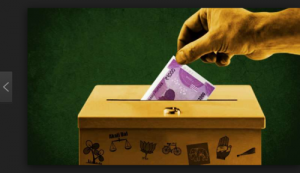
Government Amends Law To Enable Foreign Political Funding, Activists Decry
New Delhi: Indian political parties in India are now exempted from any type of scrutiny for their past foreign funding. They have been enabled to receive political donations from Indians living abroad as well as foreign companies having subsidiaries in India.

A law was recently amended in a controversial manner on foreign donations, with retrospective effect it was rushed through the parliament house by the government at the centre last month without holding any debate.
The crucial amendment to the Foreign Contribution (Regulation) Act, 2010, which had in its previous version banned all the political parties in India from receiving any type of foreign funding, has drawn condemnation from activists.

India’s two main national political parties – the ruling Bharatiya Janata Party ( BJP) and the opposition Congress party – both were found guilty of breaking the law by a court in Dehli in 2014. In the verdict, the court had said that both the two parties accepted funds from companies that are owned by London-listed group Vedanta Resources between 2004 and 2012.
A New Delhi based election eyekeeper, the Association for Democratic Reforms (ADR), was the main litigant in the case.
“The sole purpose of this latest move is to save the two major parties of the country from humiliation of being pronounced guilty of violating the foreign funding law,” Jagdeep Chhokar, founder of ADR, told News Agency.
“If foreign entities can donate money to political parties that means they wield control over the governance of the nation. No country with any self-respect would want its political parties to be controlled by foreign money,” Chhokar said.
And this is not the first instance that the law has been changed to ensure political parties get protection from legal consequences of breaking foreign funding rules.
“Effectively the law as it stands today is that any foreign company can donate any amount of money to Indian political parties through their subsidiaries in India. They can do so by purchasing electoral bonds which makes it anonymous,” Prashant Bhushan, senior Supreme Court lawyer, told News Agency.
Electoral bonds are promissory notes that can be encashed by any registered political party through a designated bank account in India. Bonds would allow anonymous type of digital donations to parties.
“Any foreign company can now come and buy a political party here,” Bhushan said.
With this latest amendment in effect, the government has made it sure that that funds received by political parties since 1976 cannot be investigated.
Under the old law without the amendment, any type of foreign donations received by political parties before September 26, 2010 were open to investigation by law enforcement agencies.
This is “blatantly unfair” said former chief election commissioner of India Shahabuddin Yaqoob Qureshi.
“This will make Indian elections and Indian politics vulnerable to foreign influence and pressure. The logic for banning it in the past was that foreigners should not influence India’s politics,” Qureshi told Al Jazeera.
“Now that logic is being altered and that too with retrospective effect. Retrospective effect means maybe there are some skeletons in the cupboard of these parties.”
The ruling BJP party defended the amendment and said it was “committed to ensuring transparency”.
“This amendment has been passed with the consent of all the political parties in India,” said Syed Zafar Islam, the BJP spokesperson, adding that his government brought “transparency in political funding”.
You May Also Read: People Express Anger Over The Video Of Palestinian Being Shot By Israeli Sniper